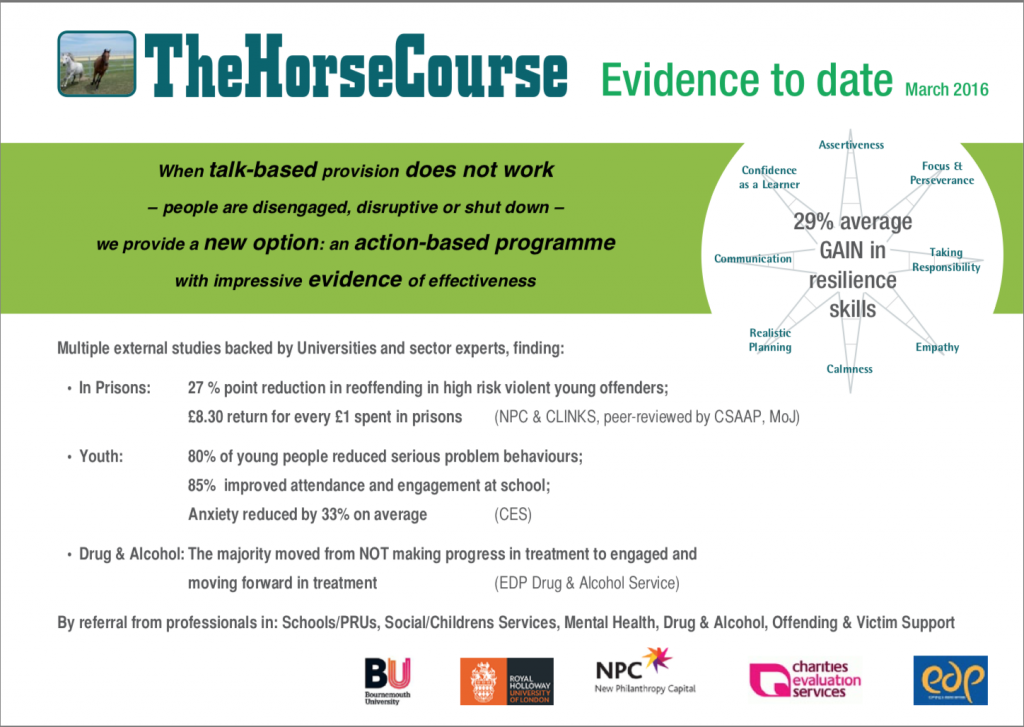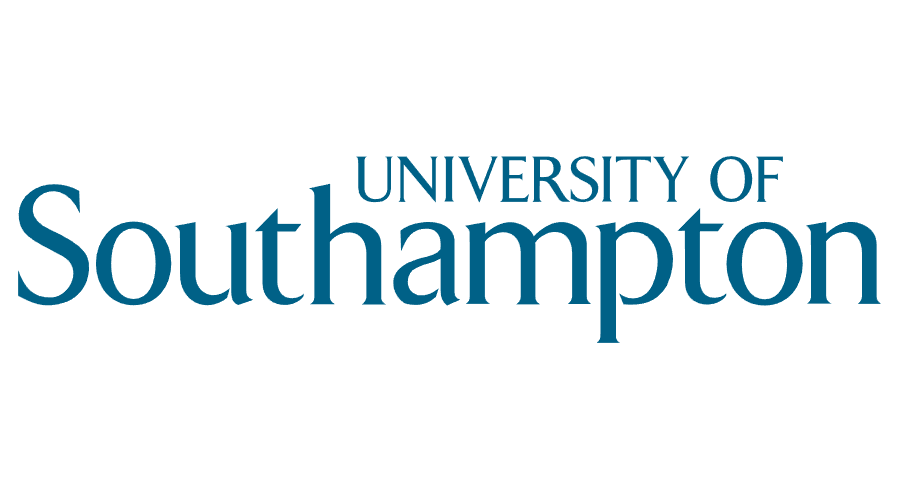EVIDENCE-old
Papers and Studies (chronological)
Domestic Violence & abuse: Summary findings 2020

The impact of Dorset Families Matter and TheHorseCourse on domestic violence and abuse in Dorset’s “Troubled Families”
- Pre and 12-months Post measures across 3 different approaches plus a control group
- TheHorseCourse had the largest proportional decrease in DVA flags, down by 51% 12 months post-intervention, whereas the control group had a 17% increase. Statistically significant results p<0.05
- Detailed papers for scientific journals currently pre-press
View PDF
1 Page Summary: Evidence to date 2019

This is a one page summary of our large body of evaluation by external academics and other experts, including papers in international peer-reviewed academic journals and presentations at international conferences.
A Study Exploring the Implementation of an Equine Assisted Intervention for Young People with Mental Health and Behavioural Issues 2019

Hemingway,
A. J 2019, 2(2), 236-246
A feasibility study exploring the potential of TheHorseCourse reStart as an
appropriate subject for a gold-standard RCT clinical study. Includes some cost
benefit indicators.
An Exploration of the Mechanism of Action of an Equine-Assisted Intervention 2019

Hemingway, A.; Carter, S.; Callaway, A.; Kavanagh, E.; Ellis, S. Animals 2019, 9, 303
A bio-physiology study investigating the emotional learning journey during TheHorseCourse ReStart, published in a high impact international journal.
The Royal College of Psychiatrists
General Adult Psychiatry Annual Conference 2018

A Feasibility Study of an Equine Assisted Intervention for
Children and
Young People with Mental Health and Behavioural Challenges, 2018

Professor Ann Hemingway, BU – oral presentation at Horses in Education & Therapy International 2018 Congress, Dublin
- TheHorseCourse ReStart fulfils all elements of feasibility study and is therefore suitable for an RCT
- 95% completion rate across multiple cohorts
- Over 70% show gains in 4 intermediate outcomes:
- improved attendance and engagement with school/training/work
- improved relationships
- reduced problem behaviours
- greater self belief
A Pilot Study of the Mechanism of Action of an Equine Assisted Intervention, 2018

BU, multi-discipinary team – oral presentation at Horses in Education & Therapy International 2018 Congress, Dublin
View PDF
Call to Action, 2017

BU and others are calling for funding for an RCT (randomised controlled trial) or other large scale controlled evaluation. This is in response to BU analysis of the follow-up data on 126 participants from external professionals – the outstanding results, on top of all the previous evidence of effectiveness, have led to this call.
- 81% of participants shifted in a positive direction across 8 inter-related core skills
- the average positive shift seen using a scale 0–32 was +10.4 points for those that improved.
Statistically significant positive results (p<0.001) were found in each of the 8 dimensions of TheHorseCourse Skills Star, see THC Star online. A large standardised effect size (d=1.1) was found for the summed scores of the 8 dimensions.
Handbook of Wellbeing. Routledge 2017, Prof Kate Galvin, ed.

Chapter: Horses and Humans: Teaching Young People to be Well, Hemingway,A.
The chapter is a narrative description of a psycho-physiological study of TheHorseCourse undertaken by a multidisciplinary team at Bournemouth University.
Evaluating a natural horsemanship program in relation to the ISES first principles of horse training, 2016

Journal
of Veterinary Behavior: Clinical Applications and Research, 15 (sept oct 2016),
87. Publisher: Elsevier
BV
ISSN: 1558-7878.
Also poster presentation at ISES Conference 2016, France.
North, S., Hemingway, A., MacLean, A., Laurie, H. and Ellis Hill, C., 2016. Evaluating a natural horsemanship program in relation to the ISES first principles of horse training.
Though not strictly relating to TheHorseCourse, this found the training method we use (Parelli) to be highly congruent with the humane training principles stated by the International Society of Equitation Science.
Summary: Evidence to date 2016

A summary of all the evaluation studies on our work and a snapshot of how the ReStart works.
Full copies of most of the studies are linked below.
Equine-Facilitated Psychotherapy With Children and Adolescents: An Update and Literature Review 2015

Journal of Creativity in Mental Health, Jennifer A. Lentini & Michele S. Knox
TheHorseCourse identified in peer reviewed analysis as one of the most prominent equine-assisted methodologies
TheHorseCourse Youth Outcomes, 2015

- 33% average improvement in managing anxiety
- 29% average gain across eight core skills: Engagement, Calmness, Assertiveness, Focus & Perseverance, Empathy,
- Realistic Planning, Communication, Responsibility
- 85% of participants increased attendance/engagement with education
- 80% of referrers attribute improvements to TheHorseCourse, (55% strongly)
Produced with support from Charities Evaluation Services (part of NCVO).
View PDF
TheHorseCourse Evidence Review, working with Offenders 2015

- Including Theory of Change and Contribution Analysis
- 27 % points reduction in reoffending
- £8.30 return per £1 spent in prisons
Written in collaboration with New Philanthropy Capital (NPC) & CLINKS. Peer reviewed by the Correctional Services Accreditation & Advisory Panel (CSAAP), Ministry of Justice.
View PDF
Moving Forward in Recovery
Pilot Summer/Autumn 2015

55% of participants shifted from disengaged/not progressing in treatment to attending and progressing. They attribute this change to the course.
On average they also made a 12% improvement on the 8 skills taught by TheHorseCourse. Produced by EDP Drug & Alcohol Services (main service provider in the Southwest, UK)
View report
Interim Evaluation Report, 2012, with update 2015

Dr Rosie Meek, Head of Criminology, Royal Holloway University
An Exploration of an Equine Facilitated Learning Intervention with Young Offenders 2014

International peer reviewed scientific journal: Society and Animals ISSN: 1063-1119
Hemingway, A., Meeks, R. and Ellis-Hill, C.
View PDF
Criminology Dissertation 2013

Rachel Natasha Thomas, BSc Applied Social Sciences, Southampton University.
A careful analysis of exit interviews with prisoner participants.
TheHorseCourse Star

TheHorseCourse Star shows the eight areas we work on directly during the course. It is marked up as part of the referral process, later as the basis for discussion of outcomes together with the participant and finally as part of the feedback from referrers 2 months post-intervention.
UK Prison-oriented people may be interested in the correlation between the star points and the identified needs in OASys (Offender Assessment System). This version of the star shows the roughly corresponding sections.
